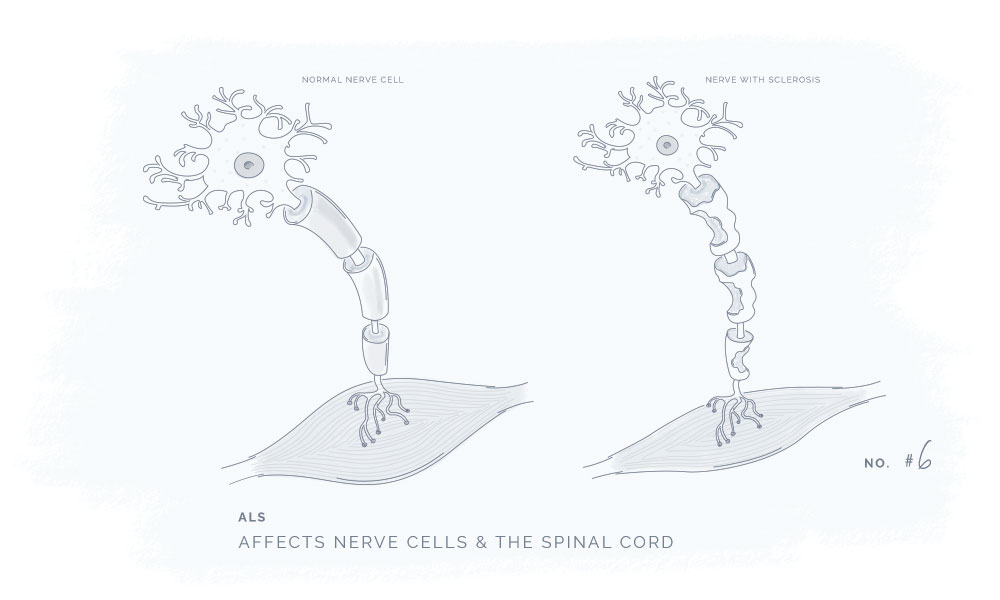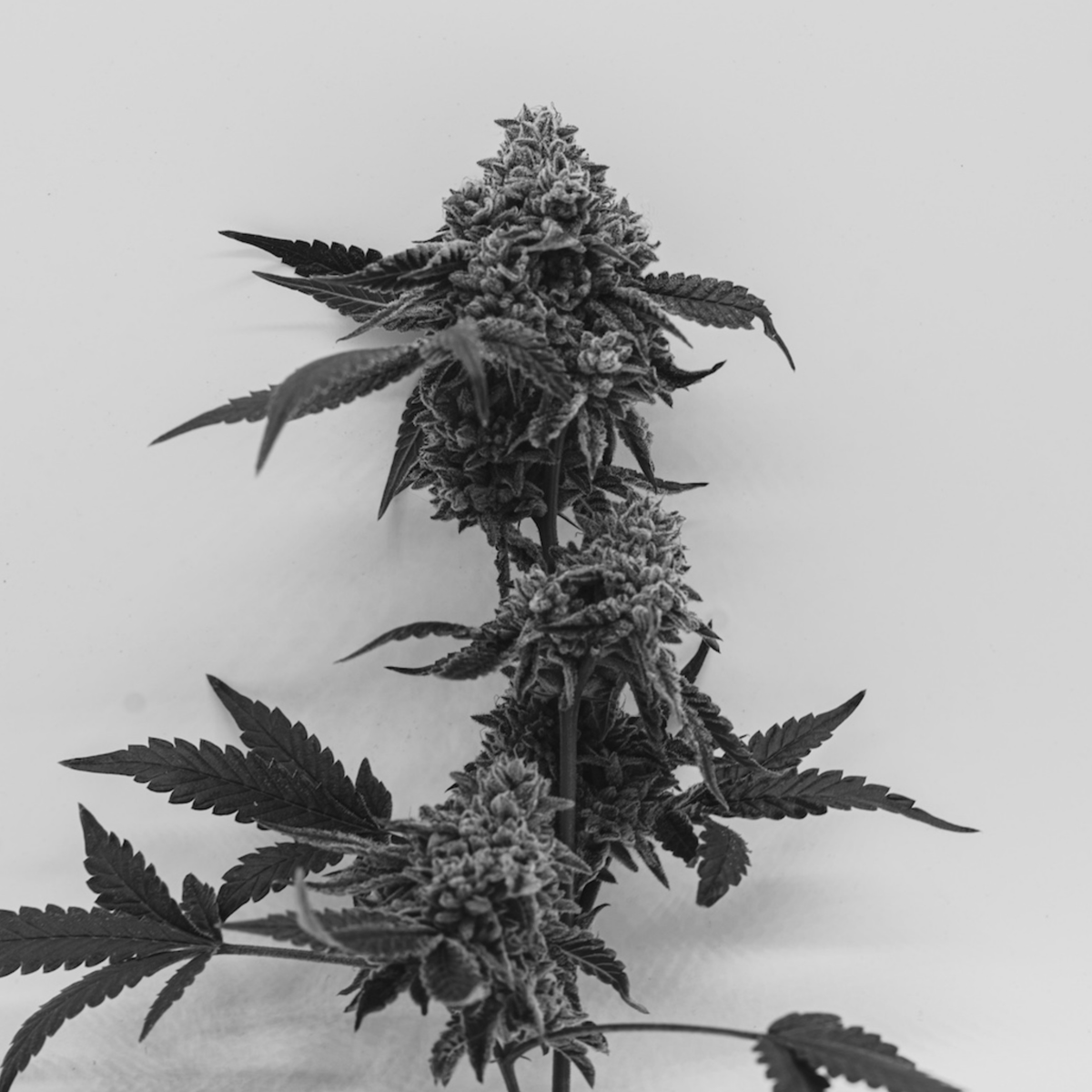
Amyotrophic Lateral Sclerosis
Autoimmune, Inflammatory, Skin

What is ALS
Amyotrophic lateral sclerosis (ALS) is a progressive nervous system disease that causes loss of muscle control due to nerve cells in the brain and spinal cord being affected. ALS is a fatal disease as it affects the control of muscles necessary to move, speak, eat, and breathe. Currently, there is no cure to treat ALS and people rarely experience pain in the early or later stages of ALS.
Symptoms
The signs and symptoms depend on which motor neurons are affected and therefore differ greatly from person to person. However, people with ALS may often experience slurred speech, muscle twitching, and weakness in the hands, feet, or limbs before spreading to the rest of the body.
Other common symptoms are:
- Difficulty performing normal daily activities
- Lack of balance e.g. ripping and/or falling
- Muscle cramps and spasticity
- Difficulty swallowing
- Change in behavior and cognitive processes
Cause
Research proposes that ALS can be possibly caused by a complex interaction between genetic and environmental factors, whereas heredity accounts for 5%-10% of the cases. Furthermore, the risk of developing ALS is increased with age. Environmental factors like smoking, exposure to toxins, and military service may lead to the development of ALS.
ALS Symptoms
Muscle cramps, spasticity, lack of balance, and change of cognitive processes making normal daily activities difficult to perform.
Therapeutic Potential
Preclinical data suggests CBD and THC among other cannabinoids may be therapeutic for ALS.
Application options
Depending on your needs, the optimal type of application may vary. Find more information on our application options.
The connection between Cannabinoids & Amyotrophic Lateral Sclerosis
Studies find that CBD and THC may have great therapeutic potential and may be used to help treat ALS. CBD and THC are well-known cannabinoids, however, they do not have the same psychoactive effects. THC is psychoactive while CBD does not possess psychoactive effects. According to WHO guidelines, the cannabidiol CBD is generally well tolerated with a good safety profile.
Clinical evidence proposes the involvement of the endocannabinoids system in the treatment of ALS, as cannabinoids may prevent both neuronal excitotoxicity and degeneration, and hence may help reduce disease progression and improve the quality of life in such patients.
Furthermore, preclinical data suggest that cannabis exhibits antioxidative, anti-inflammatory, and neuroprotective effects.
Other findings show that cannabinoids may also be used in the treatment of spasticity in patients with ALS.

Literature Discussion
The literature discussion is an overview of the published results from scientific studies investigating if and how cannabinoids can be beneficial in the treatment of ALS. The overview will be updated regularly to ensure the newest and most accurate information.
Cannabinoid receptor CB2 potentiallt involved in gliosis
Patients with ALS and gliosis were shown to have an elevated level of CB2 in the spinal cord- and cortical motor neurons, as well as astrocytes but no changes, were observed in CB1 , MAGL, or FAAH .
THC possess treatment potential in ALS
In the TDP-43 (A315T) mouse model of ALS, reactive gliosis can be reduced by THC-like substances. Also, motor performance can be ameliorated by THC-like substances via CB2.
In the hSOD(G93A) mouse model of ALS, it was shown that elevation of 2AG by MAGL inhibition can play a role in shielding against inflammation and neurodegeneration.Cannabinoid CBG may exhibit protective properties
In the hSOD(G93A) mouse model of ALS, a synthetic cannabigerol (CBG) derivative exhibited protective effects against reactive gliosis, preserved motor neurons, and attenuated weight loss via PPARγ .
Clinical Trials
Clinical trials are research studies that examine new treatments and evaluate their effects on human health outcomes.
Progression of CBD may be slowed down by CBD
In a case report, it was found that the progression of some but not all symptoms of ALS may be slowed down upon treatment with CBD].
Treatment with CBD and/or THC may reduce symptoms of spasticity
A multicenter, double-blind, randomized, placebo-controlled, phase 2 trial included 59 subjects with ALS to assess whether THC/CBD oromucosal spray (1/1 mix) may help reduce spasticity. Each dose contained 2.7 mg THC and 2.5 mg CBD and subjects were directed to use a maximum of 12 doses per 24h. Participants who were treated with THC/CBD oromucosal spray
cortical motor neurons were shown to improve on the Modified Ashworth Scale by 0.11, whereas health deterioration was observed in the placebo group by 0.16 (effect size 0.32, p=0.01) ].
In a cannabis user survey, 13 participants with ALS reported that the symptoms of appetite loss, depression, pain, spasticity, and drooling may be reduced when using cannabis, giving moderate effectiveness].
Cannabinoids & Receptors
Below you find the plant cannabinoids, cannabinoid receptors, and endocannabinoids that are associated with the potential therapy.
CBD
Cannabidiol (CBD) is a dominant cannabinoid in hemp. CBD does not possess psychoactive effects and does not make people high. CBD has been demonstrated to have potential as an alternative for several health-related conditions, including anxiety, pain, depression, among others.
THC
Tetrahydrocannabinol (THC) is a cannabinoid found in the cannabis plant. THC possesses psychoactive properties.
CB2
Cannabinoid receptors are located on the surface of cells in your body and they “listen” to conditions outside the cell. CB2 receptors are key players in the ECS. CB2 receptors are more abundant outside the nervous system, including cells of the immune system.
If you have any further information relevant to the connection between ALS and cannabinoids or find any of the information inaccurate, outdated or incomplete please contact us here
References
- https://www.mayoclinic.org/diseases-conditions/amyotrophic-lateral-sclerosis/symptoms-causes/syc-20354022
- https://ghmedical.com/endocannabinoid-system/diseases/als
- Carter, G., et. Al. Cannabis and amyotrophic lateral sclerosis: hypothetical and practical applications, and a call for clinical trialshttps://pubmed.ncbi.nlm.nih.gov/20439484/
- Meyer, T., et al. Real world experience of patients with amyotrophic lateral sclerosis (ALS) in the treatment of spasticity using tetrahydrocannabinol:cannabidiol (THC:CBD)https://www.ncbi.nlm.nih.gov/pmc/articles/PMC6732193/
- Espejo-Porras, F., Fernández-Ruiz, J., and de Lago, E. (2018a). Analysis of endocannabinoidreceptors and enzymes in the post-mortem motor cortex and spinal cord of amyotrophic lateral sclerosis patients. Amyotroph. Lateral Scler. Front. Degener. 1–10. https://www.tandfonline.com/doi/abs/10.1080/21678421.2018.1425454?journalCode=iafd20
- Espejo-Porras, F., García-Toscano, L., Rodríguez-Cueto, C., Santos-García, I., de Lago, E., and Fernández-Ruiz, J. (2018b). Targeting glial CB2receptors to delay the progression of the pathological phenotype in TDP-43 (A315T) transgenic mice, a model of amyotrophic lateral sclerosis. Br. J. Pharmacol. https://pubmed.ncbi.nlm.nih.gov/29574689/
- Raman, C., McAllister, S.D., Rizvi, G., Patel, S.G., Moore, D.H., and Abood, M.E. (2004). Amyotrophic lateral sclerosis: delayed disease progression in mice by treatment with a cannabinoid. Amyotroph. Lateral Scler. Mot. Neuron Disord. Off. Publ. World Fed. Neurol. Res. Group Mot. Neuron Dis. 5, 33–39. https://www.tandfonline.com/doi/abs/10.1080/14660820310016813
- Pasquarelli, N., Engelskirchen, M., Hanselmann, J., Endres, S., Porazik, C., Bayer, H., Buck, E., Karsak, M., Weydt, P., Ferger, B., et al. (2017). Evaluation of monoacylglycerol lipase as a therapeutic target in a transgenic mouse model of ALS. Neuropharmacology. https://www.sciencedirect.com/science/article/abs/pii/S0028390817301296?via%3Dihub
- Rodríguez-Cueto, C., Santos-García, I., García-Toscano, L., Espejo-Porras, F., Bellido, Ml., Fernández-Ruiz, J., Muñoz, E., and de Lago, E. (2018). Neuroprotective effects of the cannabigerol quinone derivative VCE-003.2 in SOD1G93A transgenic mice, an experimental model of amyotrophic lateral sclerosis. Biochem. Pharmacol. https://www.sciencedirect.com/science/article/abs/pii/S0006295218303198?via%3DihubClinical trials
- Nahler, G. Co-medication with Cannabidiol May Slow Down the Progression of Motor Neuron Disease: A Case Report | OMICS International. https://www.hilarispublisher.com/open-access/comedication-with-cannabidiol-may-slow-down-the-progression-of-motorneuron-disease-a-case-report-2329-9126-1000316.pdf
- Riva, N., Mora, G., Sorarù, G., Lunetta, C., Ferraro, O.E., Falzone, Y., Leocani, L., Fazio, R., Comola, M., Comi, G., et al. (2018). Safety and efficacy of nabiximols on spasticity symptoms in patients with motor neuron disease (CANALS): a multicentre, double-blind, randomised, placebo-controlled, phase 2 trial. Lancet Neurol. https://pubmed.ncbi.nlm.nih.gov/30554828/
- Amtmann, D., Weydt, P., Johnson, K.L., Jensen, M.P., and Carter, G.T. (2004). Survey of cannabis use in patients with amyotrophic lateral sclerosis. Am. J. Hosp. Palliat. Care 21, 95–104. https://pubmed.ncbi.nlm.nih.gov/15055508/
